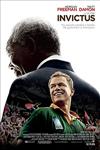- REVIEW
- READER REVIEWS
Invictus
|
(No longer in theaters)
|
|
Genre
Drama
Producer
Clint Eastwood, Mace Neufeld
Distributor
Warner Bros. Pictures
Release Date
Dec 11, 2009
Release Notes
Nationwide
Official Website
Review
The Nelson Mandela drama Invictus, directed by Clint Eastwood, centers on a true act of political symbolism that went a long way�as national sporting events can, like it or not�toward uniting a divided, potentially explosive South Africa. After his election in 1994, Mandela resisted pressure from his party to wipe out Afrikaners’ cultural institutions along with their vile system of apartheid. He not only preserved the white-run Springboks rugby team (loathed by blacks, who routinely cheered for other countries), he reached out as an ally to the captain, François Pienaar. He attended their championship match against New Zealand wearing the hated green-and-gold colors. And his instincts proved to be dead-on: Mandela helped whites save face, and they in turn began to trust�and admire�him.
Since Mandela is the closest thing to a saint we’ve seen in the last quarter-century, it seems churlish to complain that Invictus is a hagiography. It seems less churlish to complain that there isn’t a surprising note in its 134 minutes�not a line, not an image, not a performance. Eastwood directs as if he’s looking beyond the Oscar to the Nobel Peace Prize�an impressive about-face for a man who once celebrated the U.S.’s trampling of tiny Grenada and who ran for mayor of Carmel, California, as a property-rights conservative, likening an ordinance regulating second kitchens to �Adolf Hitler knocking on your door.� But Eastwood connects with this story on one crucial level: He understands the value of symbolism. Last year, in Gran Torino, he essentially killed off his vigilante icon Dirty Harry in the name of social harmony. Now he does a persuasive job underlining the character of a man whose turn away from arguably righteous vengeance set an example that will outlive us all.
As Mandela, Morgan Freeman transforms his face into an ancient yet childlike mask and speaks in exquisitely measured tones. You can appreciate Freeman’s attempt to convey Mandela’s simplicity�the product of enormous complexity, endless contemplation, and unimaginable suffering�and still get the feeling you’re watching a great actor neuter himself. Matt Damon does fine as Pienaar, donating his stardom to the cause. A scene in which Pienaar visits the tiny cell where Mandela spent three decades is one of the film’s quiet high points�underlined by Freeman’s recitation of the poem that gave the film its title: �My head is bloody but unbowed � I am the master of my fate, I am the captain of my soul.�
Eastwood is most in his element when following Mandela’s security team, an uneasy but increasingly firm alliance of blacks and the whites who used to beat, imprison, and kill them. But he makes a hash of the championship rugby match; it’s so choppy that you only know the Springboks have scored because he cuts to a cheering Mandela. Invictus doesn’t acknowledge the irony of that final match�that Mandela is rooting for Afrikaners against a team that included Maoris, a native people who had to overcome their own form of apartheid.
One aspect of Invictus is sadly relevant to our present situation. Barack Obama, who reveres Mandela, came into office thinking he could inspire the same kind of unity, only to be stymied by the opposition’s cynical and corrupt intransigence. Could even Mandela have overcome the likes of Rush Limbaugh, Karl Rove and Dick Cheney?
Related Stories
New York Magazine Reviews
- David Edelstein's Full Review (12/21/09)
